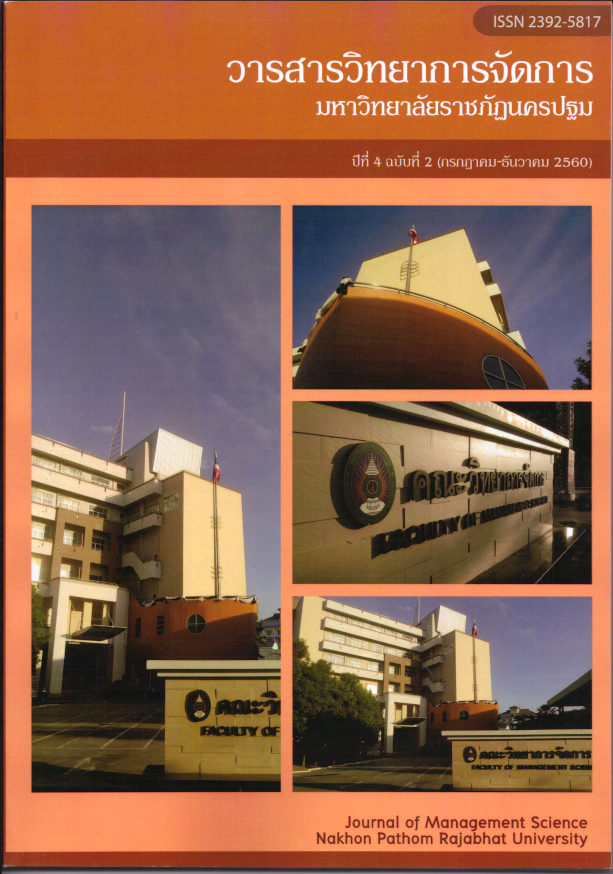Public Administration of Thailand under the Welfare State system
Main Article Content
Abstract
This article aims to introduce the concepts and Principles of welfare state administration by using the success of Sweden as a major case study. The results showed that Thailand’s welfare system is still far from it’s goal, no matter how the Thai government has been trying the best of its efforts to turn Thailand into a desirable welfare state trough various promoting policies. This article strongly suggested that the welfare state principles be implemented and Henry Fayol’s “the principles of management, POCCC” be applied to effectively and efficiently eliminate financial and social inequality of Thai people. Even if the government has to confront with obstacles and problems inevitably.
Article history : Accepted 4 May 2017
SIMILARITY INDEX = 1.24
Article Details
The views and opinions of the article appearing in this journal are those of the author. It is not considered a view and responsibility of the editorial staff.
References
กระทรวงการพัฒนาสังคมและความมั่นคงของมนุษย์. (2559). ยุทธศาสตร์กระทรวงการพัฒนาสังคมและความมั่นคงของมนุษย์ พ.ศ. 2560-2564. กรุงเทพฯ : สำนักงานปลัดกระทรวงการพัฒนาสังคมและความมั่นคงของมนุษย์.
กรมประชาสัมพันธ์. (2554). "ประชาวิวัฒน์" คืออะไร. (ออนไลน์). เข้าถึงได้จาก: https://www.prd.go.th/ewt_news.php?nid=5002.
คณะกรรมการจัดทำรายงานแสดงผลการดำเนินการของคณะรัฐมนตรีตามแนวนโยบายพื้นฐานแห่งรัฐ. 4 ปี ซ่อมประเทศไทยเพื่อคนไทยโดยรัฐบาลพันตำรวจโท ทักษิณ ชินวัตร (ปี 2544-2548). กรุงเทพฯ : คณะกรรมการจัดทำรายงานแสดงผลการดำเนินการของคณะรัฐมนตรีตามแนวนโยบายพื้นฐานแห่งรัฐ, 2547.
จดหมายข่าวรัฐบาลเพื่อประชาชน. (2559). สานพลังประชารัฐ วิสัยทัศน์ประเทศไทย. ปีที่ 2 ฉบับที่ 26 วันที่ 15 พฤษภาคม 2559.
เดโช สวนานนท์. (2546). พจนานุกรมศัพท์การเมือง. กรุงเทพฯ : หน้าต่างสู่โลกกว้าง.
ประยุทธ์ จันทร์โอชา, พลเอก. (2557) คำแถลงนโยบายต่อสภานิติบัญญัติแห่งชาติ. กรุงเทพฯ : สำนักพิมพ์คณะรัฐมนตรีและราชกิจจานุเบกษา.
พลเดช ปิ่นประทีป. (2558). วิเคราะห์ความต่าง “ประชารัฐ-ประชานิยม”. คมชัดลึก. 8 ตุลาคม 2558.
พงษ์เทพ สันติกุล (2550). โลกาภิวัตน์: บทบาทและอิทธิพลต่อกระบวนการกำหนดนโยบายการศึกษาและ สาธารณสุขของไทย. วิทยานิพนธ์สังคมสงเคราะห์ศาสตร์ดุษฎีบัณฑิต คณะสังคมสงเคราะห์ศาสตร์. มหาวิทยาลัยธรรมศาสตร์.
รพีพรรณ คำหอม. (2545). สวัสดิการสังคมกับสังคมไทย. กรุงเทพฯ : สามเจริญพาณิชย์.
ราชกิจจานุเบกษา. (2546). พระราชบัญญัติส่งเสริมการจัดสวัสดิการสังคม พ.ศ. 2546. เล่มที่ 120 ตอน 94ก หน้า 6 ลงวันที่ 1 ตุลาคม 2546.
วิกิพีเดีย สารานุกรมเสรี. (2560). รัฐ. (ออนไลน์). เข้าถึงได้จาก : https://th.wikipedia.org/wiki/%E0%B8%A3%E0%B8%B1%E0%B8%90.
สุเทพ เชาวลิต. (2527). สวัสดิการสังคม. กรุงเทพฯ : โอเดียนบุ๊คสโตร์.
สำนักงานคณะการกรรมการเศรษฐกิจและสังคมแห่งชาติ. (2559). แผนพัฒนาเศรษฐกิจและสังคมแห่งชาติ ฉบับที่ 12 (พ.ศ. 2560-2564).กรุงเทพฯ : สำนักนายกรัฐมนตรี.
อนุสรณ์ ธรรมใจ. (2558). ประชารัฐ ประชานิยม และรัฐสวัสดิการ(1). กรุงเทพธุรกิจ.
อาคม เติมพิทยาไพสิฐ. (2557). วิสัยทัศน์และยุทธศาสตร์การพัฒนาประเทศสู่ความยั่งยืน. กรุงเทพฯ : สำนักงานคณะกรรมการพัฒนาการเศรษฐกิจและสังคมแห่งชาติ.
อัมมาร สยามวาลา และสมชัย จิตสชน. (2550). แนวทางการแก้ปัญหาความยากจน : เสรีนิยม ประชานิยม หรือรัฐสวัสดิการ. เอกสารประกอบการสัมมนา. กรุงเทพ : มูลนิธิชัยพัฒนาและมูลนิธิสถาบันวิจัยเพื่อพัฒนาประเทศไทย.
Esping-Andersen, Gøsta. (1980). Social class, social democracy and state policy : party policy and party decomposition in Denmark and Sweden. Copenhagen: Institute of Organization and Industrial Sociology.
Gordon, D. and Spicker, P. (1999). The International Glossary on Poverty. Zed Books : London.
Huber, Evelyne, Charles Ragin, and John D. Stephens. (1993). Social Democracy, Christian Democracy, Constitutional Structure and the Welfare State. American Journal of Sociology 99. 3: 711-749.
Kumlin, S. (2002). Institutions-experiences-preferences : How welfare state design affects political trust and ideology. In B. Rothstein & S. Steinmo. (Eds.), Restructuring the welfare state: Political institutions and policy change. (pp. 20-50). New York : Palgrave Macmillan.


